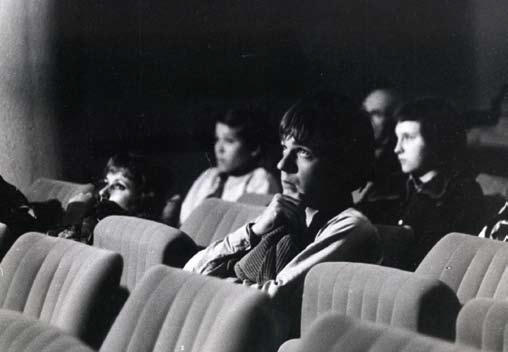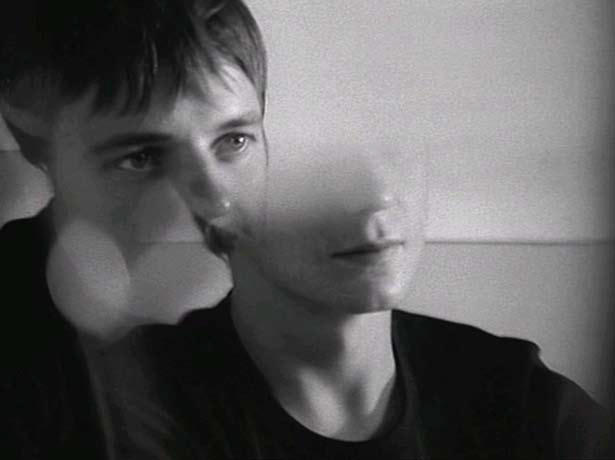
You haven’t died and you’re no wiser. You haven’t exposed your eyes to the blinding of the sun.
The two tenth-rate actors haven’t come for you, clutched you, fastened themselves so closely to you that if one were crushed all three would perish.
Merciful volcanoes have shown no concern for you.
The text of Georges Perec’s 1967 novel, Un Homme Qui Dort, was written “invisibly” at the interface of other pieces of writing, including Herman Melville’s “Bartleby, the Scrivener” and Franz Kafka’s “The Burrow.” Images, narrative lines, direct quotations, and obtuse reprocessings are disappeared into the final text, which acquires the off-kilter yet smooth surface that Perec’s highly complex experimental writing is famous for. As texts originally written in English and German, then translated into French and worked through the wild formalistic interior of Perec’s personal language games, what emerges back into English is an echo chamber of mutant allusions and distant laugh tracks.
In the film version of the novel, made in 1973–74 in collaboration with Bernard Queysanne, a compressed version of the text is read continuously in voiceover. In the French version, what mattered to Perec — as the text is written entirely in the second person — was that the voice was absolutely distinguishable from the sole “man” featured onscreen; he didn’t want the viewer to collapse the film into a simple internal monologue. For Perec, the solution was to have the voice of “a woman.” Whereas in French, the gendering functions quite flatly to produce difference, a miraculous thing happens in the English-language dubbing: Shelley Duvall.
The text of Perec’s novel was spoken by Duvall in English long before a complete translation was published. (Harry Mathews unpublished translation for the film is also radically different from Andrew Leak’s 1990 translation.) How it is that Shelley Duvall ended up as the first American voice of Georges Perec is a fascinating mystery; all I can confirm is that Perec loved Brewster McCloud (1970). But Perec was a member of the Parisian literary group Oulipo, which developed pataphysical literary techniques out of the most disfiguring aspects of translation, and I can imagine that he considered Duvall’s voice an experimental choice. Duvall, with her famously weird affect and softened Texas accent, manages to get under the skin of a split “you”: “you” the protagonist, an increasingly dissociated (male) college student walking around Paris in the late 1960s; and “you” the viewer, brought to the point of psychological exhaustion.
Three years after the release of the film, Duvall won best actress at Cannes for a different film, Robert Altman’s 3 Women. Bizarrely, Un Homme Qui Dort had been formally invited to and then formally rejected by Cannes. (Perec and Queysanne decided to have posters printed with “Cannes Official Selection 1974” anyway and showed Un Homme Qui Dort “out of competition” at the festival.) In an interview for French TV, in the midst of her big win for 3 Women, Duvall, the marvelously untrained actress, rehearsed PR lines with the same emptied-out disaffection she is known for onscreen: “No, not successful at the box office, but very successful with reviews. We got every big critic, [pause] every critic that was necessary. But the box office, no, uh, because, uh, United Artist’s artists, uh, didn’t put [pause] a lot of money into publicity.”
On and offscreen, in and out of character, Duvall acts from the outside in, like a puppet master of her own body: erasure, elimination, nullification, deletion, dissolving, disappearance, obscurity, withdrawal.
One day in Paris, circa 1967, a university student wakes up to find himself radically dissociated. Somehow, that student has the body of un homme and the voice of Duvall, and, on walking into Paul Virilio’s classroom (he lent it, full of exam-taking students, for the filming of this scene), s/he “would prefer not to.” Listen to the voice:
You get up too late. You’re not going to say on four, eight, or twelve ruled pages what you know you should think about alienation, or the working class, or modern life and leisure, about the white-collar worker or automation, about other-directedness, about Marx’s critic [sic] of de Tocqueville, or Margaret Mead versus Marcuse. You wouldn’t have said anything, in any case, since your knowledge is small and your opinions are nonexistent. Your seat remains empty. You won’t get your degree, you’ll never begin your advanced studies. [Sound of a rotary alarm clock ticking very fast.] You’ll give up your studies altogether.
It’s been a long time since your alarm clock stopped at 5:15. Time no longer enters the silence of your room: it’s outside, a lasting, obsessive, inaccurate, rather dubious medium. Time passes, but you never know the time. It’s ten o’clock, maybe eleven, it’s late, it’s early. Day breaks, night falls. The sounds never stop altogether, time never stops altogether. Even if it’s no longer anything but a tiny breech in the wall of silence, a somnambulant murmur forgotten bit by bit, scarcely distinguishable from your heartbeats. Your room is the most beautiful of desert islands, and Paris is a desert that no one has ever traversed.
